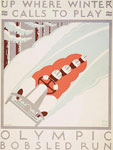Dempsey Fight Bell
Tukufu Zuberi speaks to Bert Sugar, author of over 80 books on boxing history, about boxer Jack Dempsey, his fame, and his 1919 fight for the heavyweight world championship.
Tukufu Zuberi speaks to Bert Sugar, author of over 80 books on boxing history, about boxer Jack Dempsey, his fame, and his 1919 fight for the heavyweight world championship.
ESPN newsanchor and author Jeremy Schaap discusses African-American track and field athlete Jesse Owens's win of four gold medals and setting of three world records at the 1936 Berlin Olympics. Schaap examines the events in the context of Hitler's Germany's racism.
This Electronic Field Trip uses the history of early baseball as a window into American life in the 19th century. Watchers journey back in time to discover a young land as its enterprising soul comes of age in the villages and towns of 19th-century America and follow the exploration of a western frontier after an anguishing Civil War to see how natives and naturalized citizens forge a familiar pastime while learning each other's customs and cultures.

The 2012 Summer Olympic Games begin on July 27 and continue through August 12. London hosts them this time, but in the past, the U.S. has hosted the Olympics eight times (four times in the summer and four in the winter), the most of any country! The U.S. also holds the greatest number of Olympic medals of any nation—more than 2,500.
What place have the Olympics had in U.S. history? The games can be many things: a focus for cultural exchange, a showcase for new technology and development, an economic boon (or bust), and a platform for international political tensions. Explore the history of the Olympics with these ideas:
Whether you use the Olympics to explore cultural and technological change, international politics, local history (if you're lucky enough to live in one of the U.S. cities that hosted the Olympics!), or any of the many other rich angles possible, take advantage of this opportunity! Though school may not be in session for you right now, investigating Olympics history can lead to primary sources and historical connections you can weave into your curriculum.
Teaching with sports history doesn't have to stop with the Olympics! Sports can help students connect to history and see how many different forces contribute to a person's life or a historical event. Browse our Website Reviews for sports-related primary sources, take a quiz on sports history, or watch historian Pellom McDaniels III connect athlete Jackie Robinson and Martin Luther King Jr. using primary sources.
The Oklahoma Historical Society, with its affiliate, the Jim Thorpe Foundation, preserves and displays the former home of the 1912 Olympian containing exhibited artifacts from Jim Thorpe and his family.
The home offers tours.
This Electronic Field Trip looks at the representation of baseball in American popular culture and art.
This electronic field trip looks at pioneering women baseball players, owners, umpires, and teams from as early as 1866, all the way up to present-day women playing and working in baseball. The common thread running through the stories examined is the efforts of women and girls to be a part of America's national pastime: baseball.
Many Americans are surprised to learn that women once played professional baseball in the All-American Girls Professional Baseball League (AAGPBL), from 1943-1954. Founded by Chicago Cubs owner Phil Wrigley as a method to entertain Americans and keep ball parks full during World War II, the league provided an unprecedented opportunity for young women to play professional baseball; see the country; and aspire to careers beyond the traditional female roles of teacher, secretary, nurse, librarian, or housewife.
The National Polish-American Sports Hall of Fame exhibits a collection of historic artifacts at the American Polish Cultural Center in Troy, Michigan. Many of the items are one-of-a-kind. Visitors can see the uniforms worn by such greats as Steve Gromek, Carol Blazejowski, and Ed Olczyk; the boxing gloves used by the 1940s world middleweight champion, Tony Zale; and basketballs, baseballs, footballs, and bowling balls used and signed by Mike Krzyzewski, Whitey Kurowski, Ted Marchibroda, and Ed Lubanski. Among other items is a football signed by NPASHOF inductee Bob Skoronski, Vince Lombardi and many other members of the 1967 Super Bowl I Champion Green Bay Packers.
The hall offers exhibits.
In this podcast, Richard Miller describes the first major league baseball game on the West Coast, on April 15, 1958, when the Giants played the Dodgers.
This Smithsonian Institution Traveling Exhibition podcast outlines the life and impact of Puerto Rican baseball player Roberto Clemente (19341972), who, later in life, played professional baseball in the U.S. and became a hero and spokesman for Puerto Rico, as well as a civil rights activist.